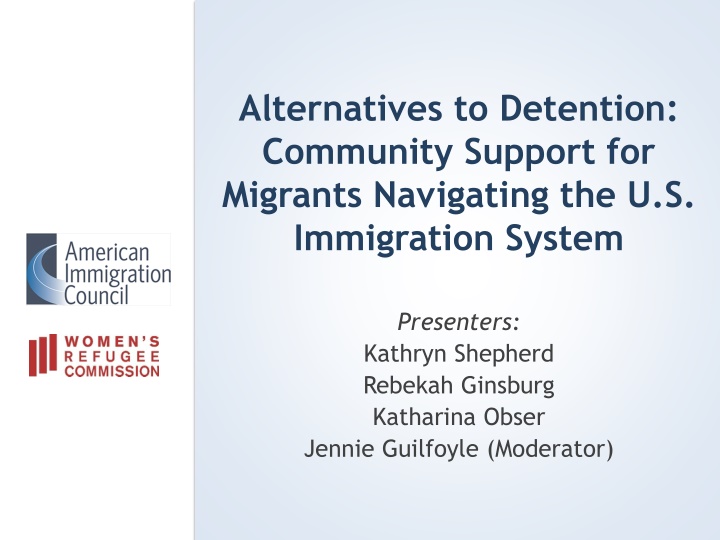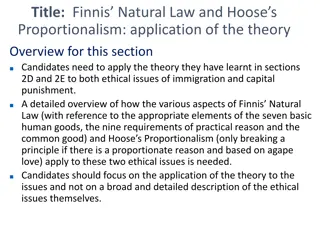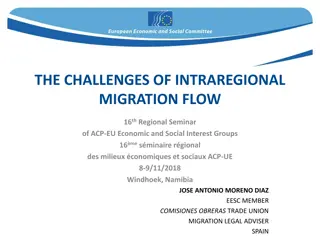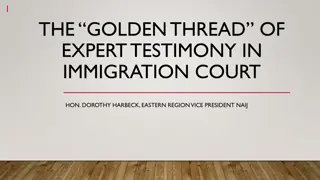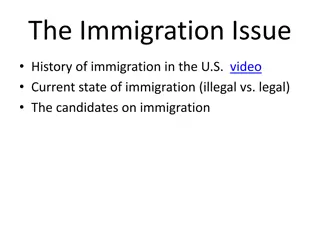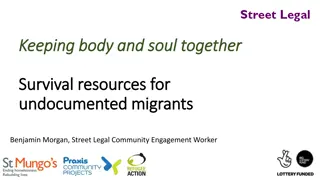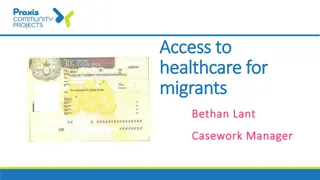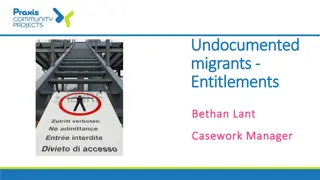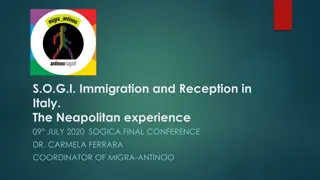Enhancing Community Support for Migrants in the U.S. Immigration System
Explore the imperative shift towards Alternatives to Detention (ATD) programs for migrants in the U.S., emphasizing the need for community-based services over detention. Delve into current challenges, such as the limitations of existing programs like Intensive Supervision Appearance Program (ISAP) and Family Case Management Program, and discover key findings on service provisions and future needs highlighted by organizations serving migrant populations. Discover insights on funding considerations and the role of community organizations in reshaping immigration support frameworks.
Download Presentation

Please find below an Image/Link to download the presentation.
The content on the website is provided AS IS for your information and personal use only. It may not be sold, licensed, or shared on other websites without obtaining consent from the author.If you encounter any issues during the download, it is possible that the publisher has removed the file from their server.
You are allowed to download the files provided on this website for personal or commercial use, subject to the condition that they are used lawfully. All files are the property of their respective owners.
The content on the website is provided AS IS for your information and personal use only. It may not be sold, licensed, or shared on other websites without obtaining consent from the author.
E N D
Presentation Transcript
Alternatives to Detention: Community Support for Migrants Navigating the U.S. Immigration System Presenters: Kathryn Shepherd Rebekah Ginsburg Katharina Obser Jennie Guilfoyle (Moderator)
Background & Context Why detention must end. Alternatives to Detention (ATD): Must focus on least restrictive option. Must result in reduction of the use of detention.
Background & Context Current U.S. government ATD programs are out of step with best practices. Intensive Supervision Appearance Program (ISAP): Operated by BI, Inc., a subsidiary of the GEO Group. Does not include meaningful case support. Has expanded surveillance, not reduced detention.
Background & Context Family Case Management Program: A more community-oriented approach. Measured outcomes not only by appearance rates, but also service referrals. Program s contracting to GEO Care problematic.
Background & Context Where we are today: Re-thinking ATD, case management, and community-based services. Principles to inform appropriate support to those in the immigration system. Why we conducted this survey: The role community-based organizations can play in ending detention and informing a new approach to immigration.
Key Findings Organizations provide a wide range of services. 70% provide long-term services, 50% short- term, and 42% both. Many organizations have either a large capacity or serve small populations. Organizations want to expand capacity. Interest in expanding capacity accompanies a predicted increase in demand.
Services Provided 200 182 180 150 160 146 141 Number of Responses 135 140 118 115 114 120 100 80 60 30 40 23 20 0
Areas of Current and Future Need Organizations can expand capacity with further investment. Funding, availability of resources, and COVID-19 impact on the capacity of service providers.
Funding 74% of respondents would consider some type of federal funding. Most favorable funding sources: state/local government, VOCA, ORR. Least favorable funding source: ICE.
Relationships with Government Agencies Respondents have a wide variety of relationships with different entities. Working relationships with state or local agencies are more common than federal ones. Most organizations (51%) have relationships with both.
Access to Legal Counsel Recent report by Ingrid Eagly and Steven Shafer shows vast majority 96% of non-detained people who have counsel show up to court hearings. Increasing support and funding to organizations will only increase the number of people who attend court and are able to obtain relief.
Policy Perspectives Punitive and costly immigration detention is not the answer. A new approach to supporting migrants in U.S. immigration system is long overdue. Strong footprint of community-based services exists, but more support, funding, and collaboration is needed.
How You Can Help American Immigration Council: www.americanimmigrationcouncil.org Up-to-date information Volunteer with the Immigration Justice Campaign, www.immigrationjustice.us Make your voice heard Take Action https://immigrationjustice.us/advocacy/take-action/ Women s Refugee Commission: www.womensrefugeecommission.org
